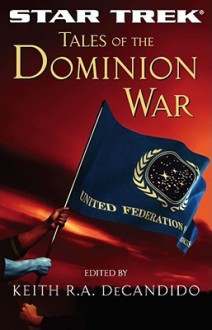
Another anthology - this time the common factor is the Dominion War... and what practically every crew ever shown in TV or TrekLit was up to in that time.
Michael Jan Friedman's What Dreams May Come focuses on Gilaad Ben Zoma, Picard's former first officer on the Stargazer... rather unmemorable, maybe because it's been so very long since I've read the Stargazer books.
Night of the Vulture by Greg Cox follows up on the entity which thrived on dissent and conflict, first shown in TOS' Day of the Dove. Nice idea, but ultimately also not exactly memorable.
Keith R. A. DeCandido's The Ceremony of Innocence is Drowned is set on Betazed right at the moment of the Dominion invasion. Usually I'm not really a fan of Lwaxana, but this story rang true, all the emotions, the terror, the incredulity that the Dominion would take such a daring step (and the Federation's being caught ill-prepared)... It also fits in with "The Battle of Betazed", a novel about the occupation and liberation of Betazed. Well done.
Blood Sacrifice by Josepha Sherman & Susan Shwartz shows Spock on Romulus during In the Pale Moonlight...a Romulus that still contemplates an alliance with the Dominion until the Emperor suddenly dies. A fine glimpse back into the worldbuilding the 2 authors did with their "Vulcan's (noun)"-series.
Mirror Eyes by Heather Jarman & Jeffrey Lang is about the outbreak of a disease on Bajor... and only a nurse, presumed Vulcan but actually a Romulan sleeper, can provide the cure. Not exactly exciting.
Twilight's Wrath by David Mack highlights Shinzon, turning a suicide mission into success. Actually very good - Mack-like bloody and violent, but also an intriguing tale of oppression, hatred and revenge.
Eleven Hours Out by Dave Galanter focuses on Picard and Troi during the Breen attack on Earth... immemorable.
Safe Harbors by Howard Weinstein takes place at the same time when Scotty and McCoy are stuck on a semi-hostile planet, reluctant to help with repairs, with a damaged ship when contact to Earth breaks up. Better... but a bit contrived. Or is it really believable that these 2 are on the same ship just at that moment?
Field Expediency by Dayton Ward & Kevin Dilmore has SCE's Duffy and Stevens on a planet to retrieve some Dominion gadget from a downed ship when the Jem'Hadar attack. Good read, but still not too different from the early SCE... in short, doesn't tell us anything new about the characters.
Haven' read Robert Greenberger's A Song Well Sung - if not absolutely necessary, I won't voluntarily read about Klingons.
Zak Kebron tells his son the "heroics" of the Excalibur during the Dominion War in Peter David's Stone Cold Truths... nice tale, definitely one of the highlights, and a nice ring back to a time when I still liked TNF (i.e. up to Dark Alles).
Michael A Martin & Andy Mangels' Requital focuses on one of the soldiers in AR-558 who can't just forgive and forget, and is recruited by an equally disillusioned Cardassian to assassinate the Founder after the war's end. Interesting and quite disturbing - especially the apparent lack of psychological aid.
Overall, a couple of highlights, the rest mediocre, unfortunately. Still, it was nice to read stories of authors that I haven't seen in modern TrekLit for a decade or so. So much has changed in the production line since the early 2000s when this anthology was published...

 Log in with Facebook
Log in with Facebook 








